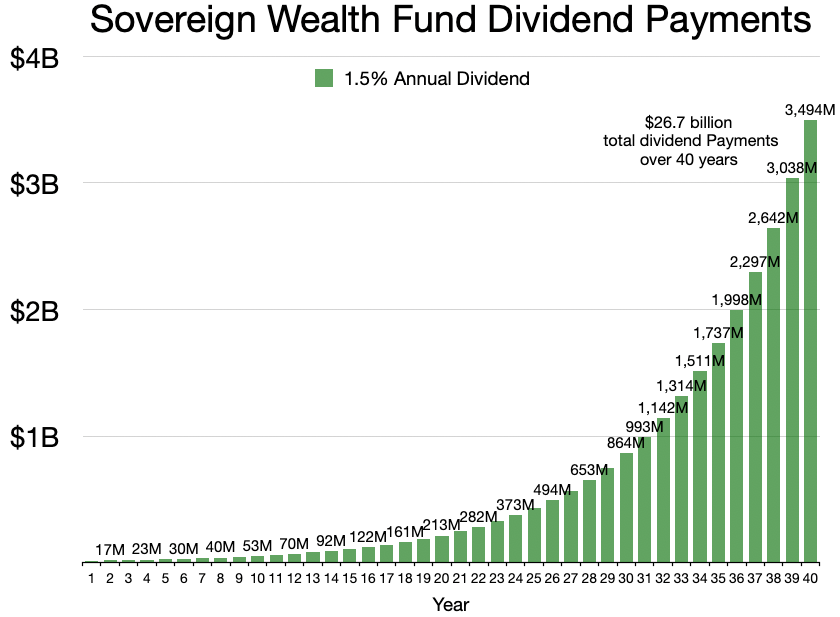|
Santiago Principles
The Santiago Principles or formally the Sovereign Wealth Funds: Generally Accepted Principles and Practices (GAPP) are designed as a common global set of 24 voluntary guidelines that assign best practices for the operations of Sovereign Wealth Funds (SWFs). They are a consequence of the concern of investors and regulators to establish management principles addressing the inadequate transparency, independence, and governance in the industry. They are guidelines to be followed by sovereign wealth fund management to maintain a stable global financial system, proper controls around risk, regulation and a sound governance structure. As of 2016 30 funds have formally signed up to the Principles and joined the IFSWF representing collectively 80% of assets managed by sovereign funds globally or US$5.5 trillion. The principles are maintained and promoted by the International Forum of Sovereign Wealth Funds (IFSWF) and whose membership have to either have implemented or aspire to implement t ... [...More Info...] [...Related Items...] OR: [Wikipedia] [Google] [Baidu] |
Best Practice
A best practice is a method or technique that has been generally accepted as superior to alternatives because it tends to produce superior results. Best practices are used to achieve quality as an alternative to mandatory standards. Best practices can be based on self-assessment or benchmarking. Best practice is a feature of accredited management standards such as ISO 9000 and ISO 14001. Some consulting firms specialize in the area of best practice and offer ready-made templates to standardize business process documentation. Sometimes a best practice is not applicable or is inappropriate for a particular organization's needs. A key strategic talent required when applying best practice to organizations is the ability to balance the unique qualities of an organization with the practices that it has in common with others. Good operating practice is a strategic management term. More specific uses of the term include good agricultural practices, good manufacturing practice, good labora ... [...More Info...] [...Related Items...] OR: [Wikipedia] [Google] [Baidu] |
Economic Risk
In simple terms, risk is the possibility of something bad happening. Risk involves uncertainty about the effects/implications of an activity with respect to something that humans value (such as health, well-being, wealth, property or the environment), often focusing on negative, undesirable consequences. Many different definitions have been proposed. One international standard definition of risk is the "effect of uncertainty on objectives". The understanding of risk, the methods of assessment and management, the descriptions of risk and even the definitions of risk differ in different practice areas (business, economics, environment, finance, information technology, health, insurance, safety, security, privacy, etc). This article provides links to more detailed articles on these areas. The international standard for risk management, ISO 31000, provides principles and general guidelines on managing risks faced by organizations. Definitions of risk Oxford English Dictionary ... [...More Info...] [...Related Items...] OR: [Wikipedia] [Google] [Baidu] |
Sovereign Wealth Funds
A sovereign wealth fund (SWF), or sovereign investment fund, is a state-owned investment fund that invests in real and financial assets such as stocks, bonds, real estate, precious metals, or in alternative investments such as private equity funds or hedge funds. Sovereign wealth funds invest globally. Most SWFs are funded by revenues from commodity exports or from foreign exchange reserves held by the central bank. Some sovereign wealth funds may be held by a central bank, which accumulates the funds in the course of its management of a nation's banking system; this type of fund is usually of major economic and fiscal importance. Other sovereign wealth funds are simply the state savings that are invested by various entities for investment return, and that may not have a significant role in fiscal management. The accumulated funds may have their origin in, or may represent, foreign currency deposits, gold, special drawing rights (SDRs) and International Monetary Fund ... [...More Info...] [...Related Items...] OR: [Wikipedia] [Google] [Baidu] |
Carnegie Endowment For International Peace
The Carnegie Endowment for International Peace (CEIP) is a nonpartisan international affairs think tank headquartered in Washington, D.C., with operations in Europe, South Asia, East Asia, and the Middle East, as well as the United States. Founded in 1910 by Andrew Carnegie, the organization describes itself as being dedicated to advancing cooperation between countries, reducing global conflict, and promoting active international engagement between the United States and countries around the world. It engages leaders from multiple sectors and across the political spectrum. In the University of Pennsylvania's "2019 Global Go To Think Tanks Report", Carnegie was ranked the number 1 top think tank in the world. In the ''2015 Global Go To Think Tanks Report'', Carnegie was ranked the third most influential think tank in the world, after the Brookings Institution and Chatham House. It was ranked as the top Independent Think Tank in 2018. Its headquarters building, prominently locate ... [...More Info...] [...Related Items...] OR: [Wikipedia] [Google] [Baidu] |
Standards Organization
A standards organization, standards body, standards developing organization (SDO), or standards setting organization (SSO) is an organization whose primary function is developing, coordinating, promulgating, revising, amending, reissuing, interpreting, or otherwise contributing to the usefulness of technical standards to those who employ them. Such an organization works to create uniformity across producers, consumers, government agencies, and other relevant parties regarding terminology, product specifications (e.g. size, including units of measure), protocols, and more. Its goals could include ensuring that Company A's external hard drive works on Company B's computer, an individual's blood pressure measures the same with Company C's sphygmomanometer as it does with Company D's, or that all shirts that should not be ironed have the same icon (a clothes iron crossed out with an X) on the label. Most standards are voluntary in the sense that they are offered for adoption by people ... [...More Info...] [...Related Items...] OR: [Wikipedia] [Google] [Baidu] |
International Standard
An international standard is a technical standard developed by one or more international standards organizations. International standards are available for consideration and use worldwide. The most prominent such organization is the International Organization for Standardization (ISO). Other prominent international standards organizations including the International Telecommunication Union (ITU) and the International Electrotechnical Commission (IEC). Together, these three organizations have formed the World Standards Cooperation alliance. Purpose International standards can be applied directly or adapted to meet local conditions. When adopted, they lead to the creation of national standards that are either equivalent to or largely align with the international standards in technical content, though they may have: (i) editorial variations, such as differences in appearance, the use of symbols, measurement units, or the choice of a point over a comma as the decimal marker, and (ii) va ... [...More Info...] [...Related Items...] OR: [Wikipedia] [Google] [Baidu] |
Accountability
In ethics and governance, accountability is equated with answerability, culpability, liability, and the expectation of account-giving. As in an aspect of governance, it has been central to discussions related to problems in the public sector, nonprofit, private (corporate), and individual contexts. In leadership roles, accountability is the acknowledgment of and assumption of responsibility for actions, products, decisions, and policies such as administration, governance, and implementation, including the obligation to report, justify, and be answerable for resulting consequences. In governance, accountability has expanded beyond the basic definition of "being called to account for one's actions". It is frequently described as an account-giving relationship between individuals, e.g. "A is accountable to B when A is obliged to inform B about A's (past or future) actions and decisions, to justify them, and to suffer punishment in the case of eventual misconduct." Accountabi ... [...More Info...] [...Related Items...] OR: [Wikipedia] [Google] [Baidu] |
Risk Management
Risk management is the identification, evaluation, and prioritization of risks, followed by the minimization, monitoring, and control of the impact or probability of those risks occurring. Risks can come from various sources (i.e, Threat (security), threats) including uncertainty in Market environment, international markets, political instability, dangers of project failures (at any phase in design, development, production, or sustaining of life-cycles), legal liabilities, credit risk, accidents, Natural disaster, natural causes and disasters, deliberate attack from an adversary, or events of uncertain or unpredictable root cause analysis, root-cause. Retail traders also apply risk management by using fixed percentage position sizing and risk-to-reward frameworks to avoid large drawdowns and support consistent decision-making under pressure. There are two types of events viz. Risks and Opportunities. Negative events can be classified as risks while positive events are classifi ... [...More Info...] [...Related Items...] OR: [Wikipedia] [Google] [Baidu] |
Financial Risk
Financial risk is any of various types of risk associated with financing, including financial transactions that include company loans in risk of default. Often it is understood to include only downside risk, meaning the potential for financial loss and uncertainty about its extent. Modern portfolio theory initiated by Harry Markowitz in 1952 under his thesis titled "Portfolio Selection" is the discipline and study which pertains to managing market and financial risk. In modern portfolio theory, the variance (or standard deviation In statistics, the standard deviation is a measure of the amount of variation of the values of a variable about its Expected value, mean. A low standard Deviation (statistics), deviation indicates that the values tend to be close to the mean ( ...) of a portfolio is used as the definition of risk. Types According to Bender and Panz (2021), financial risks can be sorted into five different categories. In their study, they apply an algorith ... [...More Info...] [...Related Items...] OR: [Wikipedia] [Google] [Baidu] |
Corporation
A corporation or body corporate is an individual or a group of people, such as an association or company, that has been authorized by the State (polity), state to act as a single entity (a legal entity recognized by private and public law as "born out of statute"; a legal person in a legal context) and recognized as such in Corporate law, law for certain purposes. Early incorporated entities were established by charter (i.e., by an ''ad hoc'' act granted by a monarch or passed by a parliament or legislature). Most jurisdictions now allow the creation of new corporations through List of company registers, registration. Corporations come in many different types but are usually divided by the law of the jurisdiction where they are chartered based on two aspects: whether they can issue share capital, stock, or whether they are formed to make a profit (accounting), profit. Depending on the number of owners, a corporation can be classified as ''aggregate'' (the subject of this articl ... [...More Info...] [...Related Items...] OR: [Wikipedia] [Google] [Baidu] |
Sovereign Wealth Fund
A sovereign wealth fund (SWF), or sovereign investment fund, is a state-owned investment fund that invests in real and financial assets such as stocks, Bond (finance), bonds, real estate, precious metals, or in alternative investments such as private equity funds or hedge funds. Sovereign wealth funds invest globally. Most SWFs are funded by revenues from commodity exports or from foreign exchange reserves held by the central bank. Some sovereign wealth funds may be held by a central bank, which accumulates the funds in the course of its management of a nation's banking system; this type of fund is usually of major economic and fiscal importance. Other sovereign wealth funds are simply the state savings that are invested by various entities for investment return, and that may not have a significant role in fiscal management. The accumulated funds may have their origin in, or may represent, foreign currency deposits, gold, special drawing rights (SDRs) and International Moneta ... [...More Info...] [...Related Items...] OR: [Wikipedia] [Google] [Baidu] |
Investment
Investment is traditionally defined as the "commitment of resources into something expected to gain value over time". If an investment involves money, then it can be defined as a "commitment of money to receive more money later". From a broader viewpoint, an investment can be defined as "to tailor the pattern of expenditure and receipt of resources to optimise the desirable patterns of these flows". When expenditures and receipts are defined in terms of money, then the net monetary receipt in a time period is termed cash flow, while money received in a series of several time periods is termed cash flow stream. In finance, the purpose of investing is to generate a Return (finance), return on the invested asset. The return may consist of a capital gain (profit) or loss, realised if the investment is sold, unrealised capital appreciation (or depreciation) if yet unsold. It may also consist of periodic income such as dividends, interest, or rental income. The return may also inclu ... [...More Info...] [...Related Items...] OR: [Wikipedia] [Google] [Baidu] |






